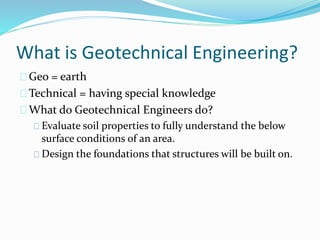Our Geotheta Diaries
Our Geotheta Diaries
Blog Article
The Main Principles Of Geotheta
Table of ContentsExcitement About GeothetaA Biased View of GeothetaWhat Does Geotheta Mean?What Does Geotheta Do?More About Geotheta

They carry out website examinations, collect samples, perform research laboratory examinations, and assess information to review the viability of the ground for construction projects - Consulting Engineers. Based on their findings, geotechnical engineers offer suggestions for foundation style, slope stability, keeping frameworks, and reduction of geotechnical hazards. They work together with various other professionals, such as engineers, structural engineers, and construction teams, to make certain that geotechnical factors to consider are incorporated into the general job design and application
By examining the actions and buildings of dirt and rock, they can determine potential geotechnical threats such as landslides, dirt settlement, or slope instability. Their expertise aids stop failures or crashes that could threaten lives and property. Here are some thorough tasks and obligations of a geotechnical designer: Website Investigation: Geotechnical designers conduct site investigations to collect data on subsurface problems.
They translate the data to understand the homes and habits of the soil and rock, including their strength, permeability, compaction characteristics, and groundwater problems. Geotechnical Analysis and Design: Geotechnical engineers examine the data collected throughout website examinations to assess the security and viability of the website for building and construction jobs. They carry out geotechnical calculations and modeling to evaluate variables such as birthing capability, settlement, incline stability, side earth pressures, and groundwater circulation.
Fascination About Geotheta
Foundation Style: Geotechnical designers play a critical duty in designing foundations that can safely support the intended structure. They assess the soil conditions and tons requirements to figure out the appropriate structure kind, such as shallow structures (e.g., footings), deep foundations (e.g (https://allmyfaves.com/geotheta?tab=Geotheta)., piles), or specialized methods like soil enhancement. They think about variables such as negotiation restrictions, bearing ability, and soil-structure interaction to create ideal foundation designs
They examine construction strategies, monitor website activities, and carry out area evaluations to verify that the design suggestions are adhered to. If unforeseen geotechnical problems arise, they evaluate the situation and provide referrals for remediation or adjustments to the design. Risk Analysis and Reduction: Geotechnical designers evaluate geotechnical risks and dangers related to the job website, such as landslides, liquefaction, or dirt erosion.

Partnership and Interaction: Geotechnical designers function carefully with other experts included in a task, such as designers, architectural designers, and building teams. Effective communication and collaboration are important to integrate geotechnical considerations right into the total job style and building and construction process. Geotechnical engineers offer technical proficiency, solution inquiries, and guarantee that geotechnical needs are fulfilled.
Not known Factual Statements About Geotheta
Below are some kinds of geotechnical engineers: Foundation Engineer: Structure designers specialize in designing and examining structures for frameworks. They analyze the dirt conditions, lots needs, and site attributes to establish one of the most ideal foundation kind and style, such as shallow foundations, deep foundations, or specialized methods like stack structures.
They examine the factors affecting incline security, such as dirt residential properties, groundwater problems, and slope geometry, and establish approaches to avoid slope failures and alleviate dangers. Quake Designer: Quake engineers concentrate on assessing and designing structures to endure seismic forces. They evaluate the seismic threat of a site, examine dirt liquefaction potential, and create seismic design requirements to make sure the security and resilience of structures throughout earthquakes.
They do field screening, collect examples, and assess the accumulated information to identify the dirt properties, geologic formations, and groundwater problems at a website. Geotechnical Instrumentation Designer: Geotechnical instrumentation designers concentrate on monitoring and determining the actions of soil, rock, and structures. They install and keep instrumentation systems that check variables such as soil settlement, groundwater degrees, slope motions, and structural displacements to analyze performance and give early cautions of prospective concerns.
Geotheta Things To Know Before You Buy
They conduct tests such as triaxial tests, combination examinations, straight shear examinations, and leaks in the structure tests to collect data for geotechnical evaluation and design. Geosynthetics Engineer: Geosynthetics designers specialize in the layout and application of geosynthetic materials, such as geotextiles, geogrids, and geomembranes. They use these materials to enhance soil security, reinforce slopes, give drainage options, and control erosion.
They have a tendency to be investigatory individuals, which implies they're intellectual, reflective, and curious. They are interested, systematic, rational, logical, and sensible. Some find out here now of them are also social, indicating they're kind, charitable, participating, person, caring, valuable, compassionate, tactful, and friendly. Does this sound like you? Take our free profession test to learn if geotechnical designer is among your leading career matches.
In the workplace atmosphere, geotechnical engineers use specialized software program tools to perform calculations, develop styles, and evaluate data. They prepare records, review task specs, interact with customers and employee, and coordinate task activities. The workplace setup offers a helpful setting for research study, evaluation, and partnership with other experts involved in the task.
The Of Geotheta
They frequently see job websites to perform site examinations, assess geotechnical conditions, and collect data for analysis. These gos to entail taking a trip to various locations, often in remote or challenging surfaces. Geotechnical designers may do soil tasting, conduct examinations, and screen building tasks to guarantee that the geotechnical facets of the project are being carried out appropriately.
Geotechnical engineers likewise work in specialized geotechnical labs. Geotechnical lab designers function thoroughly in these atmospheres, managing screening devices, running tools, and taping information.
Report this page